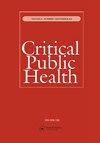Understanding compliance as multi-faceted: values and practices during the COVID-19 pandemic in Austria
IF 2.3
3区 医学
Q2 PUBLIC, ENVIRONMENTAL & OCCUPATIONAL HEALTH
引用次数: 7
Abstract
ABSTRACT In some countries, far-reaching ‘lockdown’ measures to contain the spread of coronavirus were implemented early in 2020. In Austria, these early measures were met with a high degree of compliance among the country’s population. In this paper, we draw upon qualitative interviews, and ask how people made sense of the restrictions imposed during the first lockdown in April 2020 and what shaped their compliance. Empirical research has so far tried to explain compliance by means of people’s disposition and motivations as well as demographic and social characteristics. Instead of focussing on who is compliant, we aim to understand how people practice compliance. We do this by approaching compliance through the concepts of values and practice. First, our findings indicate that people assess whether measures are suitable and legitimate in relation to the values of science, the law, and morality. Second, people assign additional personal value to compliance by stressing its positive implications on their own lives. By adopting a nuanced perspective on compliance as inextricably linked to peoples’ values and practices, our paper critically contributes to the political and scholarly discussion of pandemic public health measures. Understanding compliance through the lens of values shows how people make sense of the measures in the context of their everyday lives, helping us to move away from a binary understanding of (non-)compliance that has become morally charged.将合规理解为多方面的:奥地利新冠肺炎大流行期间的价值观和实践
摘要在一些国家,2020年初实施了影响深远的“封锁”措施,以遏制冠状病毒的传播。在奥地利,这些早期措施在该国民众中得到了高度遵守。在这篇论文中,我们利用定性采访,询问人们如何理解2020年4月第一次封锁期间实施的限制,以及是什么影响了他们的遵守。到目前为止,实证研究试图通过人们的性格和动机以及人口和社会特征来解释依从性。我们的目标不是关注谁是合规的,而是了解人们是如何实践合规的。我们通过价值观和实践的概念来实现合规。首先,我们的研究结果表明,人们评估与科学、法律和道德价值观相关的措施是否合适和合法。其次,人们通过强调顺从对自己生活的积极影响,赋予顺从额外的个人价值。通过对合规性与人们的价值观和实践密不可分采取微妙的观点,我们的论文对流行病公共卫生措施的政治和学术讨论做出了重要贡献。从价值观的角度理解合规性,表明人们如何在日常生活中理解这些措施,帮助我们摆脱对(不)合规性的二元理解,这种理解在道德上已经变得充满了负担。
本文章由计算机程序翻译,如有差异,请以英文原文为准。
求助全文
约1分钟内获得全文
求助全文
来源期刊

Critical Public Health
Multiple-
CiteScore
5.90
自引率
7.10%
发文量
36
期刊介绍:
Critical Public Health (CPH) is a respected peer-review journal for researchers and practitioners working in public health, health promotion and related fields. It brings together international scholarship to provide critical analyses of theory and practice, reviews of literature and explorations of new ways of working. The journal publishes high quality work that is open and critical in perspective and which reports on current research and debates in the field. CPH encourages an interdisciplinary focus and features innovative analyses. It is committed to exploring and debating issues of equity and social justice; in particular, issues of sexism, racism and other forms of oppression.
 求助内容:
求助内容: 应助结果提醒方式:
应助结果提醒方式:


